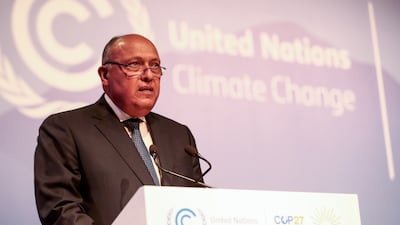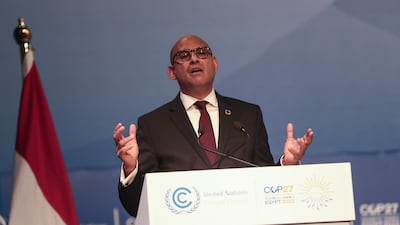The UN’s annual climate summit, Cop27, has formally opened in Egypt.
More than 120 world leaders plan to attend the crucial event in Sharm El Sheikh.
The summit comes at a critical moment with the world regularly experiencing extreme weather events linked to climate change.
Cop27 began with a speech by Cop26 president Alok Sharma to mark the formal handover to Egypt.
Cop 26 President
Two key areas on the agenda are trying to keep alive the Paris goal of limiting warming to 1.5ºC from pre-industrial levels, and the issue of finance.
Mr Sharma said the world is still not on track regarding the 1.5ºC limit, despite making progress amid a challenging geopolitical environment.
“How many wake-up calls does the world need?” asked Mr Sharma. “Entire regions are becoming unlivable [and] we must find the ability to focus on more than one thing at once. Inaction is myopic and can only defer climate catastrophe.”
He pointed to the Pakistan floods this year and drought in China as evidence that the world needs to act. He also urged more progress on finance that he said could “make or break” the programme ahead.
Mr Sharma said Cop27 had to be about “concrete action”.
“I hope world leaders explain clearly what countries have achieved [since Cop26] and go further. It is a matter of trust. I remain hopeful.”
This was followed by a speech from Cop27 president Sameh Shoukry.
He said the series of Cop summits have been “a continuous journey that has proven useful year after year. We are now more aware of the danger that threatens us … and understand better what we need to do.”
“We are determined to continue on this path. This is a defining moment and a distinguished landmark on a long road," Mr Shoukry said.
Referring to the lack of adequate action to combat climate change, he warned: “Continuing in this manner without a drastic change will have grave consequences that will be befall future generations … we are still facing gaps that continue to widen in efforts to stop rising temperatures and take measures to adjust to it or making funds available.”
Broken pledges
He also complained that the deal for $100 billion a year — pledged by rich nations in Copenhagen in 2009 — “did not find its way to implementation.”
“We cannot continue like this,” he said.
On a positive note, he lauded what he called “unprecedented leaps” in the use of renewable energy in recent years and growing societal awareness, especially among young people, of the need to effectively deal with climate change.
In a message on Facebook, Egypt's President Abdel Fattah El Sisi wrote: “These dangers and challenges require swift actions from all countries to lay down a road map for salvation that protects the world from climate change.
“Egypt is looking for this conference to emerge from the stage of promises to the stage of execution, with concrete measures on the ground that build on what we already have; the resolutions of the Glasgow summit and the Paris agreement.”
The opening ceremony also included remarks from the UN's new climate change chief, Simon Stiell; and Hoesung Lee, chair of the UN's Intergovernmental Panel on Climate Change (IPCC), which assesses the science related to climate change.
Early agreement damage funding for small nations
Cop27 started with something of a win after a loss and damage funding was added to the summit's agenda for the first time, after a 30-year wait.
This item was initially brought up by small island states to help deal with the devastating effects of climate change, but was shut down by wealthier nations.
Climate funding so far has focused on cutting carbon dioxide emissions in an effort to curb climate change, while about a third of it has gone toward projects to help communities adapt to future impacts.
Loss and damage funding would be different, in compensating costs that countries can't avoid or "adapt" to.
During Cop26 in Glasgow last year, it was agreed there would be a dialogue surrounding the funding, but it is now going to be discussed in Sharm El Sheikh.
There is no agreement yet over what should count as "loss and damage" in climate disasters.
A June report by 55 vulnerable countries estimated their combined climate-linked losses over the last two decades totalled about $525 billion, or about 20 per cent of their collective GDP.
Intense talks
The summit begins in earnest on Monday when world leaders arrive at the summit for two days of intense talks. They will also deliver addresses to the event.
After they leave on Wednesday, their negotiators will try to reach agreement on several issues over the next two weeks.
Finance is particularly divisive. Developing countries want “loss and damage” money — to fund the effects of climate change rather than prepare for its consequences — up for discussion.
Many reports released over the past months have questioned the viability of keeping the 1.5ºC target alive. One, the UN's emissions gap report, said there was no “no credible pathway” to doing so.
Egypt has said it wants this summit to be about implementation of existing climate pledges — particularly those made in Paris in 2015 at Cop21.
Global tensions such as the Ukraine war and soaring inflation are set to make this a particularly challenging summit.
Cop27 will run until November 16.




























